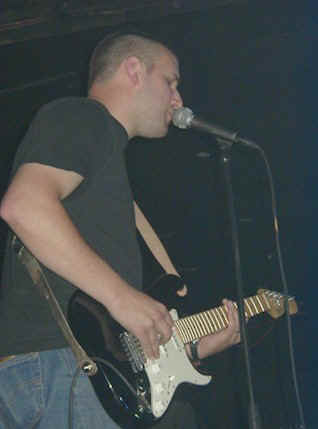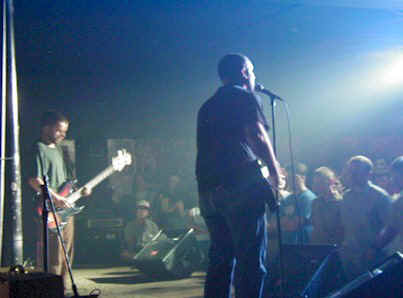 |
David
the Lion For Pedro the Lion's David
Bazan, there is no separating art and faith. The born-again rocker talks about how his
beliefs shape his music and his life.
by Tim McMahan
Despite the nature of his
music and his own personal beliefs, Pedro the Lion's David Bazan would be the first to
admit that he isn't out to convert anyone. He's no Christian rocker, but he does have a
message, and he wants you to listen.
Bazan had agreed to do an interview at the soundcheck for his July 6 show at the Sokol
Underground that also featured Velour 100 and Saddle Creek Records bands Cursive and
Bright Eyes. I showed up at the venue at around 7 p.m. and sure enough, there he was,
reclined in the payload area of a shiny white tour van that more closely resembled a
soccer-mom's SUV than a rock-and-roll caravan. Bazan looked different than the photos I'd
seen online, which pictured a thin, Amish-looking fellow with a beard and well-groomed
haircut. Not today. Bazan was clean-shaven, with a buzz-cut that bordered on skin-head. He
also looked chunkier, sort of football player-buff in his black T-shirt and shorts.
What's funny about Pedro the Lion is that almost no one seemed
to know that their music is predominately Christian in nature. Including
me. I had even carefully reviewed the CD a few months earlier and
somehow the spiritual-ness of it all just seemed to slip right past
me. I discovered my gaff after reading a couple interviews on the
'net, where Bazan talked about his faith, his music, and his loathing
for "Christian Rock."
Does he mind talking about religion during rock interviews? "I'm torn about it.
There are a lot of reasons why I wouldn't want to discuss it in this venue," he said
across a table that would later be covered with band merchandise, set up in the back of
the cavernous Sokol Underground. No one had arrived except a bartender and Marc Leibowitz,
the show's promoter (who also wasn't aware of the band's religious nature). Bandmates Trey
Many, bass; and Josh Golden, drums, were off trying to find a music store to buy a
replacement tube for a blown guitar. |
|
| Photos taken at the July 6, 2000, Pedro show at
Omaha's Sokol Underground. |
|
|
Regardless of
his apprehension, just about everything we talked about in the hour or so before Velour
100 took the stage (Bazan plays keyboards for that band, too) in some way centered around
religion or faith. The son of a music pastor for the Assemblies of God church, Bazan said
that his faith naturally permeates his music because it is an extension of who he is.
"Anyone with a strong, sincere belief in something shouldn't treat it lightly,"
he said quietly. "It seems I'm always being called upon to boil down my faith for
interviews. Defining it should be done with great care."
It is the cavalier attitude reflected by Christian rockers -- who make a living finding
ways to make holy scripture fit alongside gnarly power chords -- that drives Bazan's
hatred for their genre. In addition to their music being limitlessly cheesy, Bazan
believes Christian rock bands are wasting their time preaching from beneath a hot
spotlight when "the basic act of being creative glorifies God."
"That's where Christian rock falls apart," he said. "It turns the music
and the message into crap. The message is degraded when it's made into slogans and
low-level propaganda. They're attempting to reach a certain audience just like advertisers
do -- and that, ultimately, degrades the art."
A more pure model, he said, would be to try to express yourself artistically, as
honestly and sincerely as possible. But it's not as simple as it sounds. Artists are
constantly lured by the promise of big money and always seek approval from their peers.
"It would be naïve to think you could steer clear of the forces of money and
acceptance," Bazan said, intensely. "To ignore it is to let it rule you. You can
only control it if you openly address it."
Bazan isn't immune to the temptations. "I'm married. I'd like for my records to
sell well. I get a check and that helps me and my wife buy groceries and pay the rent. The
economics of the job are always there, along with wanting to be recognized for your
work." |
 |

|
If the
"economics" are sparse while the band's on the road (at one time he and drummer
Golden argued over the price of beer and fruit juice as if they were debating over how to
use the last of the clean water on a desert island), peer acceptance is in great supply.
The band's recent CD, Winners Never Quit, released earlier this year on Jade Tree,
has been lauded by critics and fans alike for its power, beauty and unconventional
honesty.
It's a concept album of sorts, a collection of first-person accounts, confessions and
explanations, all unregretfully sung straight from the attacker's mouth (most of the
lyrics are surrounded by quotes). They are macabre portraits of murder and violence,
justified by necessity with only a hint of regret. Each deed told is met with a clear
conscience of a man who feels his motives are misunderstood. Bazan makes the songs so
arresting and, at times, downright danceable that they're impossible to ignore. His low,
sullen voice recalls Mark Kozelek (Red House Painters) or Mark Eitzel (American Music
Club) and convincingly adds the necessary pathos that compliments the stripped-down
arrangements (Bazan played all the instruments on the recording). Half the songs are slow,
folkish dirges, the other half are indie-guitar-driven rock songs.
Call them parables, if you will. The first song on the CD, "Slow and Steady Wins
the Race," directly addresses faith and its rewards, as the narrator sings about his
devotion to all that is good, while his brother takes a darker path through life. Thanks
to his good deeds, he believes that he'll be greeted warmly in heaven with the rest of the
deserved few.
"The guy who stays on the straight and narrow represents the typical Christian
viewpoint," Bazan said. "Do what's right at all costs. It produces people who
think they're righteous and are going to heaven, and the bible's very clear that no one is
good or can earn their way because our hearts are dark. The only hope we have is in the
record and performance of a different person who's willing to let us take it all on
ourselves." |
|
|
That person,
he says matter-of-factly, is Jesus. If it sounds like the interview was getting pretty
heavy, you're right. But Bazan doesn't come off as someone who's trying to guide you on
the right path (remember, I asked the questions). He was merely explaining the songs on
his CD, most of which happen to rock like an old Jawbreaker album despite the solemn
lyrics.
There is no "praise Jesus" sloganeering to be found. Instead, "A Mind of
Her Own" is a husband arguing with his wife, beginning with "Dear, unlock the
door," and ending with "You put down that telephone/You're not calling
anyone," sung over shimmering, pounding guitar. "Never Leave a Job Half
Done" opens just after the narrator has killed his wife or lover, justifying his
crime with "She almost ruined everything." Grim, but thoroughly
danceable. "Eye on the Finish Line" is another murder tale of a criminal with
"a clear conscience" who fears his motives will be misconstrued, even by the
victim: "Given the time I think she would have understood/That it was for the
greater good."
Bazan shows us the darkest side of human nature, and hopes we walk away with a lesson.
"If you think you're good and you're proud of it, you will be very, very sorry one
day," he said. "If you're a total mess and you're sorry and you don't know what
to do about it, then there's hope.
"This record is a complete, connected narrative from the first to last song. There
was a theme I wanted to communicate: Damnation for the arrogant, judgment for the
judgmental."
Somehow he's managed to express this warning without sounding like Robert Duvall in The
Apostle, or even someone whose life is centered on his faith. He beliefs are far from
conventional, however. Bazan is outraged by how politics have influenced religion,
especially where moral issues are concerned. |
"There was a theme I wanted to
communicate: Damnation for the arrogant, judgment for the judgmental."
|
|
|
"If He's real and is a real force in my
heart or life, I don't have to be closed to anything."
|
|

|
Take
abortion, for instance. "I think it's totally tragic and wrong, but people need to be
convinced of that themselves. Legislation convinces no one. The more freedom we have as
individuals, the better it is for our culture. The more freedom, the better.
"Everyone is so closed to everything," he said of a majority of conservative
followers of organized Christianity. "If He's real and is a real force in my heart or
life, I don't have to be closed to anything. I would be the first in line to watch The
Last Temptation of Christ. It was an utterly boring movie, but it wasn't offensive. If
He's God, why would he care about a movie? It's absurd, but that's the way a lot of
Christians think. They try to close themselves off to experience. If they're that easily
contaminated, than He isn't real to them anyway, He's removed and aloof. If He were real
to you, there would be nothing to be afraid of."
The discussion didn't stop there. Bazan went on to talk about popular culture vs. art
(the brain-vacation pleasure of a confectionery movie like Mission Impossible 2 vs.
an eloquent, moving portrait of human nature like Magnolia), big money vs.
integrity (money can't buy happiness and being with a major label ultimately would mean
living with the fact that you're "a whore -- it's a trade-off," he said), and
living a corporate life vs. taking a risk on doing what you really want to do in life
("I quit my day-job to do this and it panned out, for others who've taken the risk,
it hasn't. It's about courage and luck.")
But Bazan's convinced that his rock-and-roll live won't last forever. At the tender age
of 24, he said he believes in five years he'll be making a living doing something else.
"I'll have a job that's not Pedro the Lion," he said. "My wife
(Ann-Krestene), and I agreed that I need to do this until I can't do it anymore. The day
will come when the money dries up and this will take a back seat to providing for my
family. It's inevitable."
Besides financial pressures, is he getting tired of being in a band and writing music?
"The human condition is so complicated, I can't imagine not being inspired,"
he said. "Art could not exist in a vacuum. Artists are inspired by all that's around
them. Politics are dead with the advent of big corporations. All the real heavy-duty moral
issues don't matter as much as the fabric of our lives. As things get worse -- as
teen-agers kill each other in high schools, the divorce rate skyrockets and the number of
disenfranchised grows -- inevitably there's more for the artists to write about.
"And there are some good things happening, as well," he added, smiling.
With that, Trey Many signaled Bazan to the stage to finally begin the soundcheck.
Back to 
Published in The Omaha Weekly July 13, 2000. Copyright © 2000 Tim
McMahan. All rights reserved. |
|
|

![]() webboard
interviews
webboard
interviews